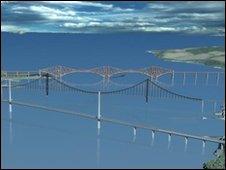Forth bridge passes first hurdle
- Published

The new bridge, if approved, would be finished by 2016
Plans for the new Forth road bridge have passed their first parliamentary hurdle.
MSPs voted for the £2bn crossing when the plans - which represent Scotland's biggest transport infrastructure project in a generation - came before the full parliament.
The project will now pass to the next stage of scrutiny at Holyrood.
Ministers said the condition of the existing bridge, linking Edinburgh and Fife, was deteriorating.
The new crossing would be built by 2016, if approved by parliament, with construction beginning next year.
The project, to be paid for by the Scottish government capital budget, was brought forward in the wake of concerns about the condition of the existing 45-year-old road bridge.
The Forth Crossing Bill was earlier backed by a special committee of MSPs set up to scrutinise the proposals, although members called for steps to be taken to ensure minimal disruption while the bridge was being built.
'Vote cast in error'
The public has also been asked for its views on continuing to use the current bridge for public transport only, when the new crossing opens.
MSPs backed the general principals of the Forth Crossing Bill by 113 votes to three, with two abstentions.
A financial resolution on the Bill was also passed by 115 votes to two, with one abstention.
Justice Secretary Kenny MacAskill voted against the law which will allow the new bridge to be built.
But the minister's spokesman said his "vote was cast in error" and that he was "fully supportive" of the government's plans for a replacement crossing.
Speaking after the debate, Transport Minister Stewart Stevenson said it was an "important milestone" for the crossing.
He said: "There is now near universal agreement that this project, the biggest Scottish infrastructure project for a generation, is vital to the sustainable growth Scotland's economy.
"The case for this project could not be more compelling and the Scottish government is committed to seeing the Forth Replacement Crossing delivered on time and on budget by 2016."
Mr Stevenson also announced measures to minimise disruption during the construction of the new bridge, including reducing working hours for the building of associated roads.
A liaison group is also being set up with local councils to try to deal with any noise issues.